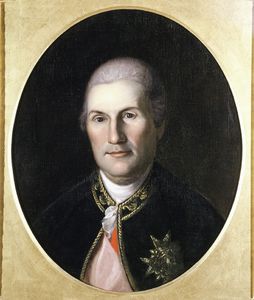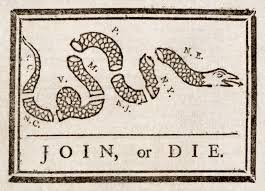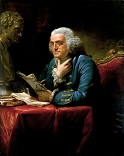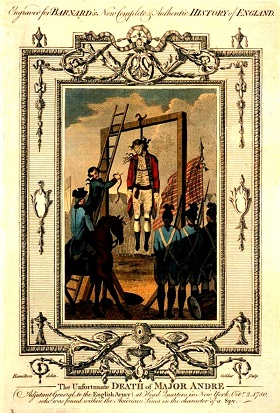Major John Andre: Page 2
Looting Benjamin Franklin's House
During his nearly nine months in Philadelphia, Andre lived in Benjamin Franklin's house. While the British were preparing to evacuate the city, Andre shocked his friend Du Simitiere (a Swiss-born citizen of Philadelphia) by looting Franklin's house. Arriving to say good-bye, Du Simitiere found the young officer -- known for his courtesy -- packing books, musical instruments, scientific apparatus, and a portrait of Franklin. Andre did not respond to Du Simitiere's protests. Long afterwards, the portrait of Franklin was returned to the America by the descendants of General Grey, and today it hangs in the White House. It now seems clear that Andre looted Franklin's house under orders from Grey, explaining Andre's inability to offer his friend an explanation.
Following Grey's departure, in November 1778, Andre was awarded the rank of major and appointed deputy Adjutant General on the the staff of Sir Henry Clinton, Howe's successor and the new British Commander in Chief.
General Clinton was solitary, resentful, and stubborn, and yet Andre was successful in gaining a friendship and even fondness. Clinton had confidence in Andre's resourcefulness and discretion, and he delegated to Andre the coordination of British intelligence activities. He entered enthusiastically into his new responsibilities. His journal sheds light on his competance maintaining secrecy among his network of spies, while gathering information as to which American officers might prove corruptible.
In 1778-79, Clinton's army wintered in New York (1778-79) and lost precious time waiting for reinforcements who didn't arrive until August.
On May 10, 1779, Andre received a most historic offer. American General Benedict Arnold, commander of West Point, the fort key to control of the Hudson Valley and New England, offered to surrender the fort to the English -- for a fee. Negotiations continued for months, but bogged down over the fee. Arnold wanted 10,000 pounds, success or failure. Clinton demanded success.
In 1779, Clinton's forces headed down to Savannah to meet the French flottila commanded by Admiral d'Estaing, where Clinton's forces easily prevailed and returned to New York.
On December 26, 1779, Andre was with Clinton for a successful amphibious assault on Charleston leading to a May 12 surrender.

Rochambeau
by Charles Willson Peale, 1782
The orignal painting is in the Second Bank Portrait Gallery
On or about May 1780, Arnold reinitiated his contact with Andre, informing him that the Rochambeau's French force was on its way to Newport, Rhode Island. In response, Clinton broke off his Southern campaign, left Cornwallis in charge and returned to New York to prepare for the French assault.
Now, Benedict Arnold arranged to be made Commandant at West Point. On July 15, Arnold asked for 20,000 pounds in return for successfully ceding West Point to the enemy. Referring to Andre, Arnold wrote to Clinton, "A personal interview with an officer that you can confide in is absolutely necessary to plan matters." This arrangement was accepted.
Benedict Arnold Gives Up the Fort
On the night of September 21, Andre came ashore from the British sloop "Vulture," anchored in the Hudson just south of West Point, met with Arnold, accepted a sheaf of documents, and spent the night at the house of Joshua Hett Smith -- the man Andre broke bread with in New York, years earlier -- some miles within the American lines.
During the night, the "Vulture" was bombarded from the shore by American artillery, and withdrew down the river.
Smith, a Loyalist collaborator, escorted Andre back to the "Vulture," only to find it missing. To their consternation, they recognized that they'd need to cross overland through American-held territory.
Andre Dresses for the Trip
Because wearing his British uniform was too dangerous, Andre donned an American uniform for the treacherous trip. Smith accompanied Andre all but the last 15 miles, which were through British territory. It was in that last distance, while traveling alone and believing himself out of danger that Andre was stopped by a trio of American freelancers, dressed in British uniform. Andre commanded them to give way. They revealed themselves and searched Andre, discovering Arnold's papers hidden in his boot, and arrested Andre for espionage.
The Treachery Is Exposed
It was assumed that Andre possessed stolen papers. What followed was a sequence of improbable coincidences and near-misses that led to the recognition that Arnold was a traitor and to his escape. Arnold learned that his treason was discovered and escaped downriver to the "Vulture" at the same time that Washington was arriving unexpectedly at West Point -- and all on the very day that the fortress was to have been surrendered to the British.
Andre was imprisoned at Tappan, New York, and on September 29, 1780, he was found guilty of being behind American lines "under a feigned name and in a disguised habit." Andre was hanged as a spy at noon on October 2, 1780.





